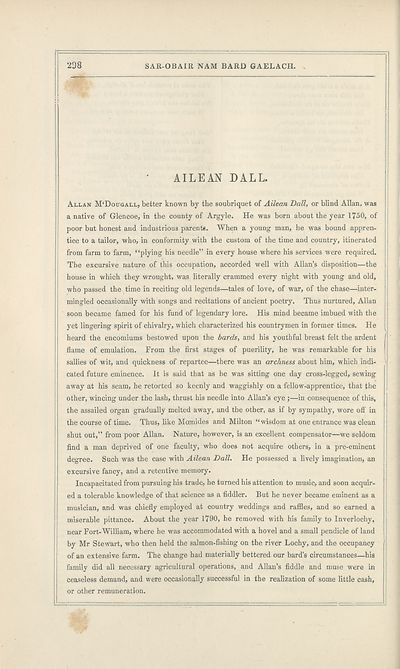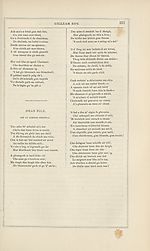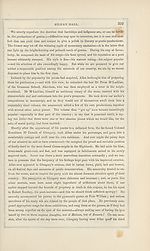Books and other items printed in Gaelic from 1871 to 1900 > Sar-obair nam bard gaelach, or, The beauties of Gaelic poetry, and lives of the Highland bards
(378) Page 298
Download files
Complete book:
Individual page:
Thumbnail gallery: Grid view | List view

SAR-OBA1R NAM BARD GAELACH.
298
AILEAN BALL.
Allan M'Dougall, better known by the soubriquet of Ailean Dali, or blind Allan, was
a native of Glencoe, in the county of Argyle. He was born about the year 1750, of
poor but honest and industrious parents. When a young man, he was bound appren¬
tice to a tailor, who, in conformity with the custom of the time and country, itinerated
from farm to farm, “plying his needle” in every house where his services were required.
The excursive nature of this occupation, accorded well with Allan’s disposition—the
house in which they wrought, was literally crammed every night with young and old,
who passed the time in reciting old legends—tales of love, of war, of the chase—inter¬
mingled occasionally with songs and recitations of ancient poetry. Thus nurtured, Allan
soon became famed for his fund of legendary lore. His mind became imbued with the
yet lingering spirit of chivalry, which characterized his countrymen in former times. He
heard the encomiums bestowed upon the bards, and his youthful breast felt the ardent
flame of emulation. From the first stages of puerility, he was remarkable for his
sallies of wit, and quickness of repartee—there was an archness about him, which indi¬
cated future eminence. It is said that as he was sitting one day cross-legged, sewing
away at his seam, he retorted so keenly and waggishly on a fellow-apprentice, that the
other, wincing under the lash, thrust his needle into Allan’s eye ,•—in consequence of this,
the assailed organ gradually melted away, and the other, as if by sympathy, wore off in
the course of time. Thus, like Mcenides and Milton “wisdom at one entrance was clean
shut out,” from poor Allan. Nature, however, is an excellent compensator—we seldom
find a man deprived of one faculty, who does not acquire others, in a pre-eminent
degree. Such was the case with Ailean Dali. He possessed a lively imagination, an
excursive fancy, and a retentive memory.
Incapacitated from pursuing his trade, he turned his attention to music, and soon acquir¬
ed a tolerable knowledge of that science as a fiddler. But he never became eminent as a
musician, and was chiefly employed at country weddings and ratfles, and so earned a
miserable pittance. About the year 1790, he removed with his family to Inverlochy,
near Fort-William, where he was accommodated with a hovel and a small pendicle of land
by Mr Stewart, who then held the salmon-fishing on the river Lochy, and the occupancy
of an extensive farm. The change had materially bettered our bard’s circumstances—his
family did all necessary agricultural operations, and Allan’s fiddle and muse were in
ceaseless demand, and were occasionally successful in the realization of some little cash,
or other remuneration.
298
AILEAN BALL.
Allan M'Dougall, better known by the soubriquet of Ailean Dali, or blind Allan, was
a native of Glencoe, in the county of Argyle. He was born about the year 1750, of
poor but honest and industrious parents. When a young man, he was bound appren¬
tice to a tailor, who, in conformity with the custom of the time and country, itinerated
from farm to farm, “plying his needle” in every house where his services were required.
The excursive nature of this occupation, accorded well with Allan’s disposition—the
house in which they wrought, was literally crammed every night with young and old,
who passed the time in reciting old legends—tales of love, of war, of the chase—inter¬
mingled occasionally with songs and recitations of ancient poetry. Thus nurtured, Allan
soon became famed for his fund of legendary lore. His mind became imbued with the
yet lingering spirit of chivalry, which characterized his countrymen in former times. He
heard the encomiums bestowed upon the bards, and his youthful breast felt the ardent
flame of emulation. From the first stages of puerility, he was remarkable for his
sallies of wit, and quickness of repartee—there was an archness about him, which indi¬
cated future eminence. It is said that as he was sitting one day cross-legged, sewing
away at his seam, he retorted so keenly and waggishly on a fellow-apprentice, that the
other, wincing under the lash, thrust his needle into Allan’s eye ,•—in consequence of this,
the assailed organ gradually melted away, and the other, as if by sympathy, wore off in
the course of time. Thus, like Mcenides and Milton “wisdom at one entrance was clean
shut out,” from poor Allan. Nature, however, is an excellent compensator—we seldom
find a man deprived of one faculty, who does not acquire others, in a pre-eminent
degree. Such was the case with Ailean Dali. He possessed a lively imagination, an
excursive fancy, and a retentive memory.
Incapacitated from pursuing his trade, he turned his attention to music, and soon acquir¬
ed a tolerable knowledge of that science as a fiddler. But he never became eminent as a
musician, and was chiefly employed at country weddings and ratfles, and so earned a
miserable pittance. About the year 1790, he removed with his family to Inverlochy,
near Fort-William, where he was accommodated with a hovel and a small pendicle of land
by Mr Stewart, who then held the salmon-fishing on the river Lochy, and the occupancy
of an extensive farm. The change had materially bettered our bard’s circumstances—his
family did all necessary agricultural operations, and Allan’s fiddle and muse were in
ceaseless demand, and were occasionally successful in the realization of some little cash,
or other remuneration.
Set display mode to:
![]() Universal Viewer |
Universal Viewer | ![]() Mirador |
Large image | Transcription
Mirador |
Large image | Transcription
Images and transcriptions on this page, including medium image downloads, may be used under the Creative Commons Attribution 4.0 International Licence unless otherwise stated. ![]()
| Permanent URL | https://digital.nls.uk/107583182 |
|---|
| Description | Out-of-copyright books printed in Gaelic between 1631 and 1900. Also some pamphlets and chapbooks. Includes poetry and songs, religious books such as catechisms and hymns, and different editions of the Bible and the Psalms. Also includes the second book ever published in Gaelic in 1631. |
|---|

